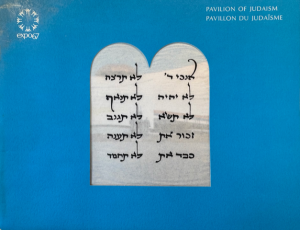 MONTREAL — A friendship between Senator Serge Joyal and Ben Weider helped cement a decision by Joyal to donate a century-old menorah to the Montreal Museum of Fine Arts (MMFA), in tribute to the late bodybuilding mogul.
MONTREAL — A friendship between Senator Serge Joyal and Ben Weider helped cement a decision by Joyal to donate a century-old menorah to the Montreal Museum of Fine Arts (MMFA), in tribute to the late bodybuilding mogul.
Canadian Senator Serge Joyal purchased this silver menorah in Paris and donated it to the Montreal Museum of Fine Arts. [Christine Guest, MMFA, photo]
The traditional seven-branched candelabrum, which Joyal purchased in Paris several years ago, is made of solid silver, weighs five kilograms and measures about two feet long by 18 inches high.
It is the “first important” Jewish religious artifact held by the museum, Joyal, a former cabinet minister under Pierre Trudeau and an expert art collector, said in an interview.
“There have been many little things, but not as telling in terms of symbolism or as important in terms of craftsmanship and, of course, origin,” he said.
Although Joyal declined to disclose what he paid for the menorah or to estimate what it will officially be appraised at, he agreed that it could be between $50,000 and $100,000.
“But I won’t be the one to pronounce on that.”
Joyal, who is not Jewish, officially presented the menorah during Chanukah, at a special candlelighting ceremony at the museum organized through the co-ordinated efforts of the museum and the Lubavitch community, whose institutions Weider helped fund.
Weider’s collection of Napoleonic artifacts is also housed at the MMFA.
Among those participating at the presentation were Joyal; Huguette Weider, Ben Weider’s widow; museum board chair Brian Levitt; Jewish community figures; and students from the Lubavitch yeshiva, who performed Chanukah songs.
For the occasion, two additional candles were set up next to the candelabrum to make it appropriate for Chanukah use.
For the veteran 13-year Liberal senator and officer of the Order of Canada, the moment was the culmination of a saga that began seven years earlier, when, on one of his regular visits to Paris, Joyal spotted the menorah in a gallery in Paris in the Richelieu-Drouot area of the second arrondisement, which is famous for its auction houses.
He was instantly enamoured of it.
“I thought it was so magnificent as a work of art and, of course, [for] the symbolism, that it should be purchased,” Joyal said.
But Joyal did not feel he should be the buyer, although he thought it should be a Canadian like himself, and he continued to “visit” the menorah on each of his subsequent trips, “like those things you feel attracted to.”
He found out that it was made around 1910, commissioned by Moroccan Jews who kept it in the same family for close to a century, until the decision was made to sell it.
Joyal also learned it was made in the artisan workshop of the Keller brothers on Rue Royale. They were Alsatian Jews from Strasbourg, who had previously won a gold medal at the Exposition Universelle in Paris in 1900.
Their workshop, established in 1857 by their father, Gustave, became very famous, Joyal said, filling private orders from affluent and influential Parisians, including prominent Jewish families.
Joyal discovered during a later visit to the Museum of Decorative Arts in Paris that the Kellers had also won a silver medal at the exposition for a silver pitcher they had made.
“That further stimulated my interest,” he said, “on the basis of their professional background and international recognition.”
Joyal initially approached three now-retired senators – Leo Kolber, Yoine Goldstein and Jerry Grafstein – as well as Weider, thinking one of them might purchase the menorah and eventually donate it to a museum or synagogue, but each declined.
So “four or five” years ago, Joyal decided to buy it himself. “I thought: ‘If you feel an attraction to something over the years, maybe you should buy it and eventually donate it yourself.’ ”
Joyal, a member of the MMFA board, decided to donate the menorah to the museum in tribute to Weider after the bodybuilder died in October 2008, just days before the museum inaugurated the new gallery containing hundreds of artifacts of Napoleon Bonaparte Weider had acquired over the years.
Joyal said his donation in tribute to his late friend was intended to reflect Weider’s “ecumenical” and “humanistic” sensibility. On one occasion, Joyal said that without prompting, he saw Weider speak to Montreal Cardinal Jean-Claude Turcotte, offering to complete the funding needed for the restoration of a Montreal cathedral.
“I would be doing the same in my own way,” Joyal said. “It would be important and underline the fact that it came from a non-Jew to an institution [Weider] had been so prominent in supporting, and to do it at a ceremony he would have liked to attend.”
The menorah will be on display in the MMFA’s decorative arts section, after the completion of the museum’s major expansion project, sometime “in the course of the next year,” Joyal said.
He noted that he and Weider shared the same birthday – Feb. 1 – and both were recipients of France’s Légion d’honneur. The friends were given promotions at the same time, he said, but the Légion’s rules prevented Weider from receiving his posthumously.
“There were many things in our lives that were going parallel to each other,” Joyal said. “We were 20 years apart [in age], but personally we had many interests in common, always calling one another, and we were close friends.
“Even though he is no longer with us, he still is in our hearts and minds.”






